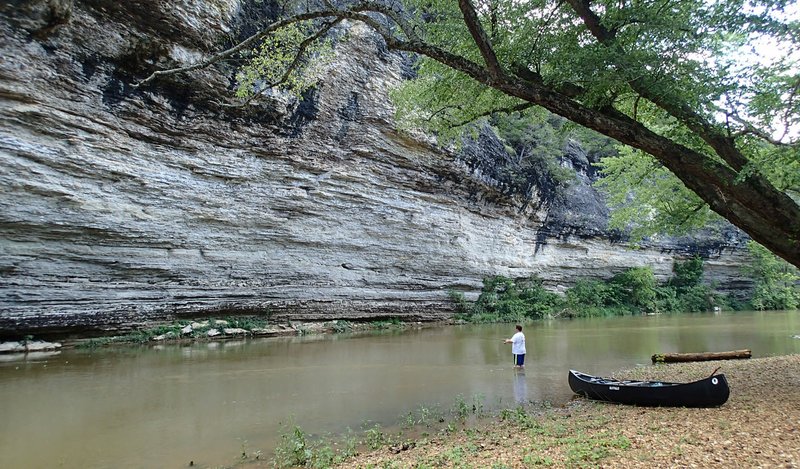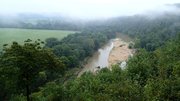Expect the unexpected during a wet summer like this one when it comes to an Ozarks float trip.
Usually on these last warm days, streams are so low you could wade and barely wet the soles of your sneakers. River runners may spend as much time walking a canoe or kayak through the shallows as they do paddling one.
Float the War Eagle
A popular section for floating on the War Eagle River is the 4.5-mile trip from U.S. 412 to Withrow Springs State Park. The river is Class I, suitable for beginners. Put-in is at the old Arkansas 68 bridge, near U.S. 412. Take-out is at the Arkansas 23 bridge in the park.
Withrow Springs State Park offers canoe rental and shuttle service April through June.
Information: Withrow Springs State Park, 479-559-2593. Beaver Watershed Alliance, 479-750-8007.
Source: Staff report
High, muddy water in the War Eagle River was a big surprise upon arrival at the stream for a float trip on Aug. 18, the dog days of summer. The dry days of August.
Alan Bland of Rogers and his paddling pal watched water flowing over the Gar Hole low-water bridge on the War Eagle. Water was the color of cream with a little coffee. The river wasn't flooding, just full to the brim after rain a day or two earlier.
Bland wagered that the high, stained water would dampen any chances of catching smallmouth bass, but the level was perfect for a fine float trip from the bridge to the take-out at a friend's private property five miles downstream near the War Eagle Mill.
His prediction was right. The catch for the whole trip was one smallmouth bass. But oh, what a day this was.
A lively current whisked the floaters along past the green forests and bluffs that cradle the War Eagle, one of Bland's favorite rivers. He's an Army Corps of Engineers ranger at Beaver Lake, but streams have a special place in his heart.
.
Floating a river has a cleansing effect, the ranger said.
"You come out here, and it's like nature resetting your clock. It clears your mind of everything," Bland said. "This time of year, even on a weekend, you might not see anybody. We always see a lot of wildlife, and the weather is perfect."
Becky Roark is another ambassador for the Ozarks' streams. She's outreach director for the Beaver Watershed Alliance and a regular War Eagle paddler.
"It's my mini Buffalo, with all the bluffs you see. And the water is so nice," she said.
One of her favorite floats is from the U.S. 412 bridge to Withrow Springs State Park, a trip of 4.5 miles. Could be because Roark caught the biggest smallmouth bass of her life on the stretch, a beauty that weighed between 2 and 3 pounds.
Part of her job with the Beaver Watershed Alliance is working landowners along streams in the Beaver Lake watershed to ensure good water quality in the reservoir, which is the primary drinking water source for Northwest Arkansas and beyond.
The alliance helps landowners create a good riparian zone along streams in the watershed. Property owners can get free seedling trees to plant along a stream. The root system helps to stabilize the bank and to prevent erosion. A strip of vegetation and trees along a stream, its riparian zone, filters pollutants such as sediment as water runs off the land into the stream.
Thirty species of trees native to the Ozarks are available free, she said.
John Pennington, Beaver Watershed Alliance executive director, hopes to catch a smallmouth like the one Roark caught every time he fishes the War Eagle. Water quality is always on his mind while exploring any stream.
The water quality of the War Eagle is pretty good, but it could always be better to a certain extent, he said.
Sediment is the biggest polluter of streams. Tons of sediment enter the War Eagle each year from runoff. A number of dirt roads are in the War Eagle watershed and that adds to the problem, Pennington added.
Certain types of aquatic life are an indicator of good water quality. Angela Danovi with Ozarks Water Watch said finding hellgrammites, mayflies, stoneflies and other sensitive species in the War Eagle indicates good water quality. These aquatic insect larvae cannot survive in polluted water.
Volunteers in her stream conservation classes kick up gravel in shallow water, which releases aquatic life such as hellgrammites. In August 2016, volunteers found seven sensitive species kicking up gravel downstream from the low dam at War Eagle Mill.
"Finding that kind of diversity is a good water quality indicator," she said.
Flip Putthoff can be reached at [email protected] or on Twitter @NWAFlip
Sports on 09/19/2017


